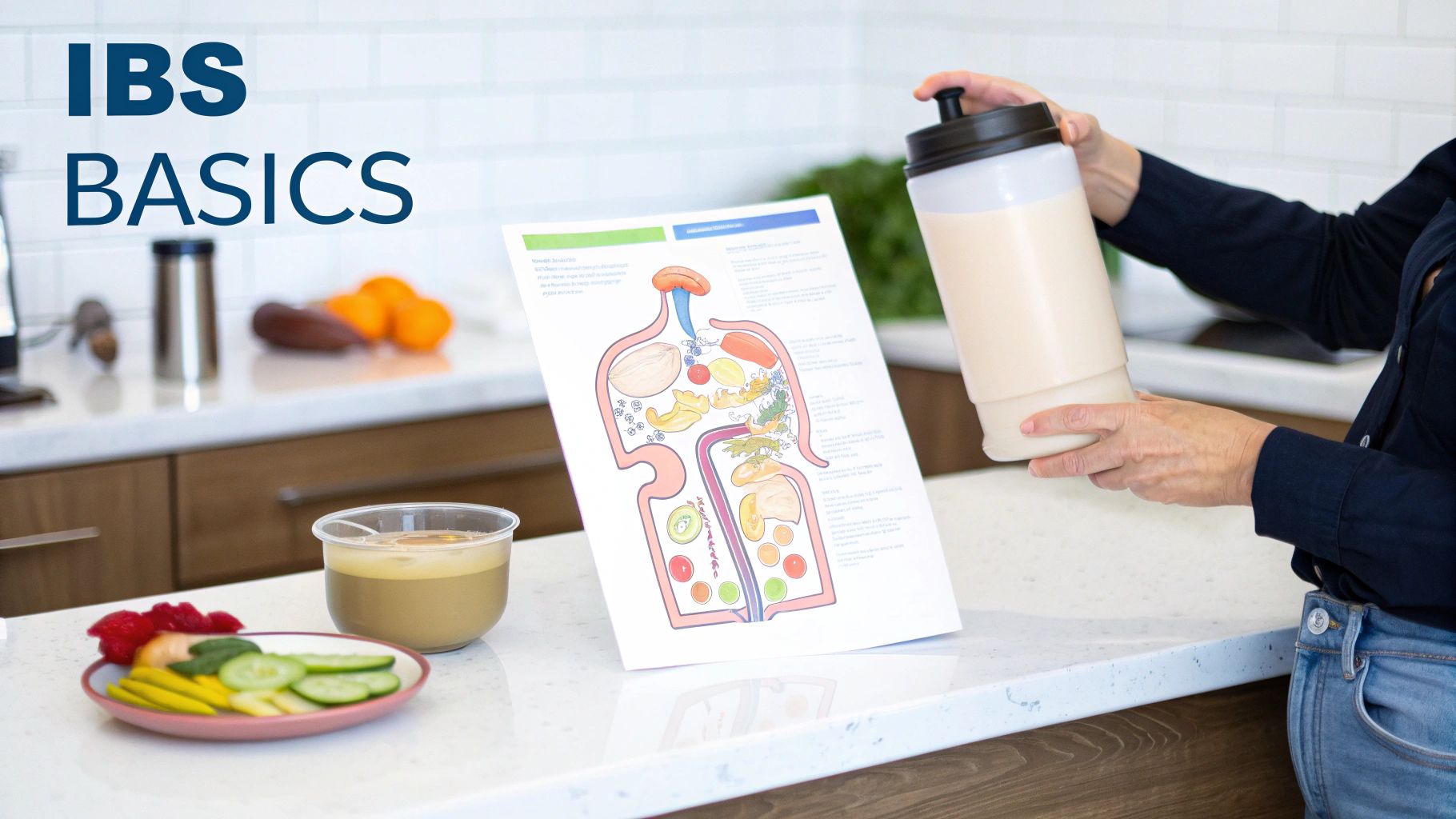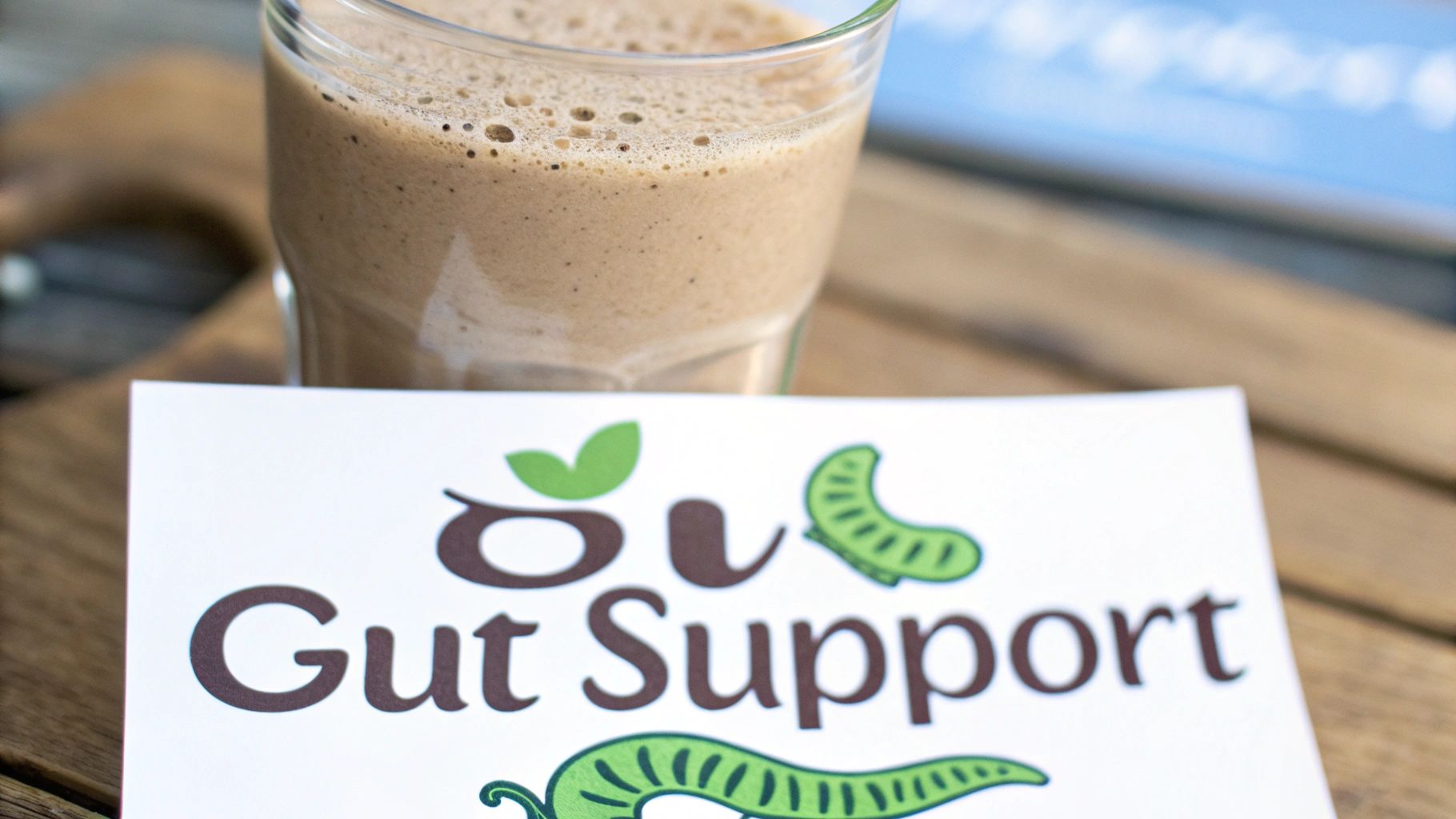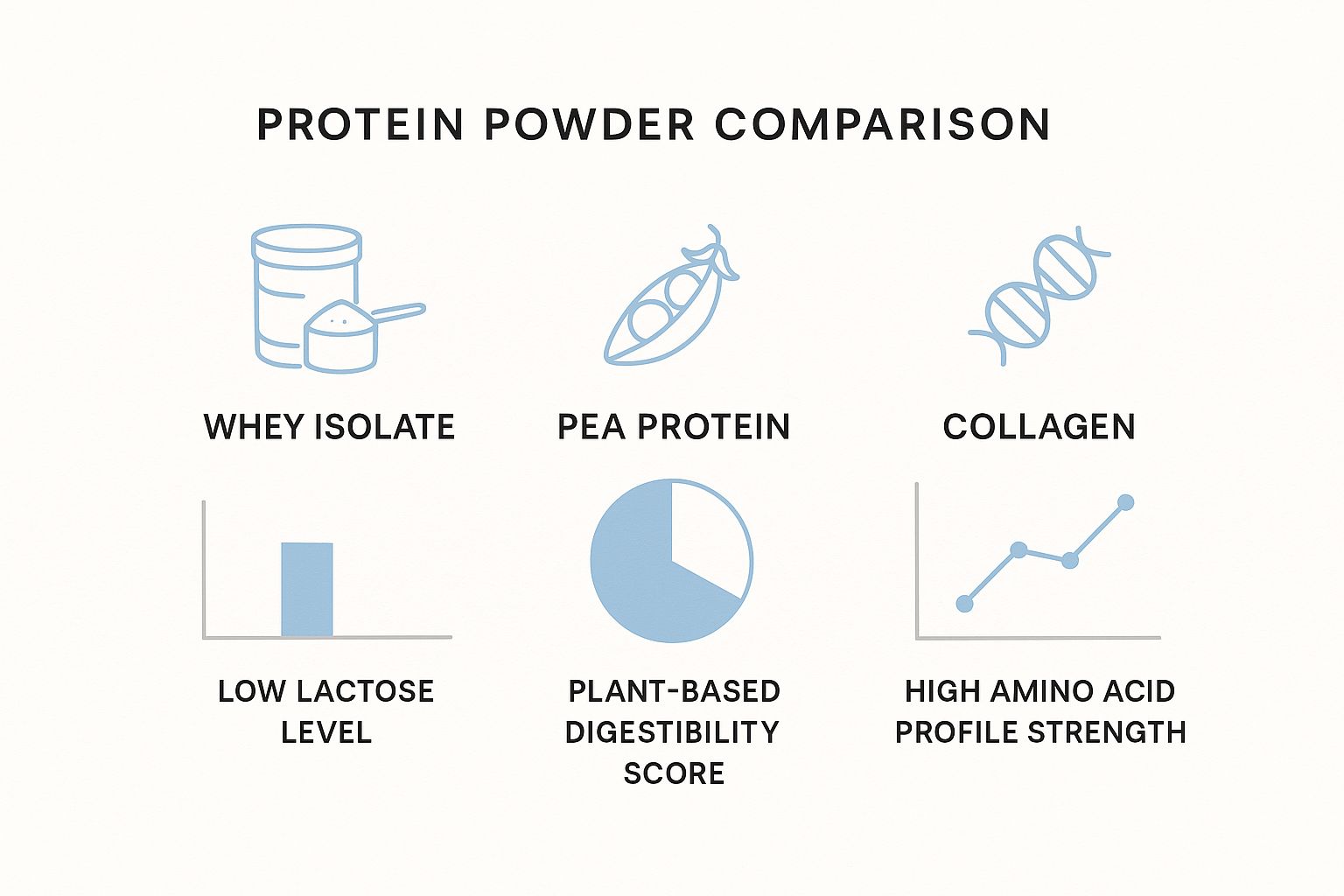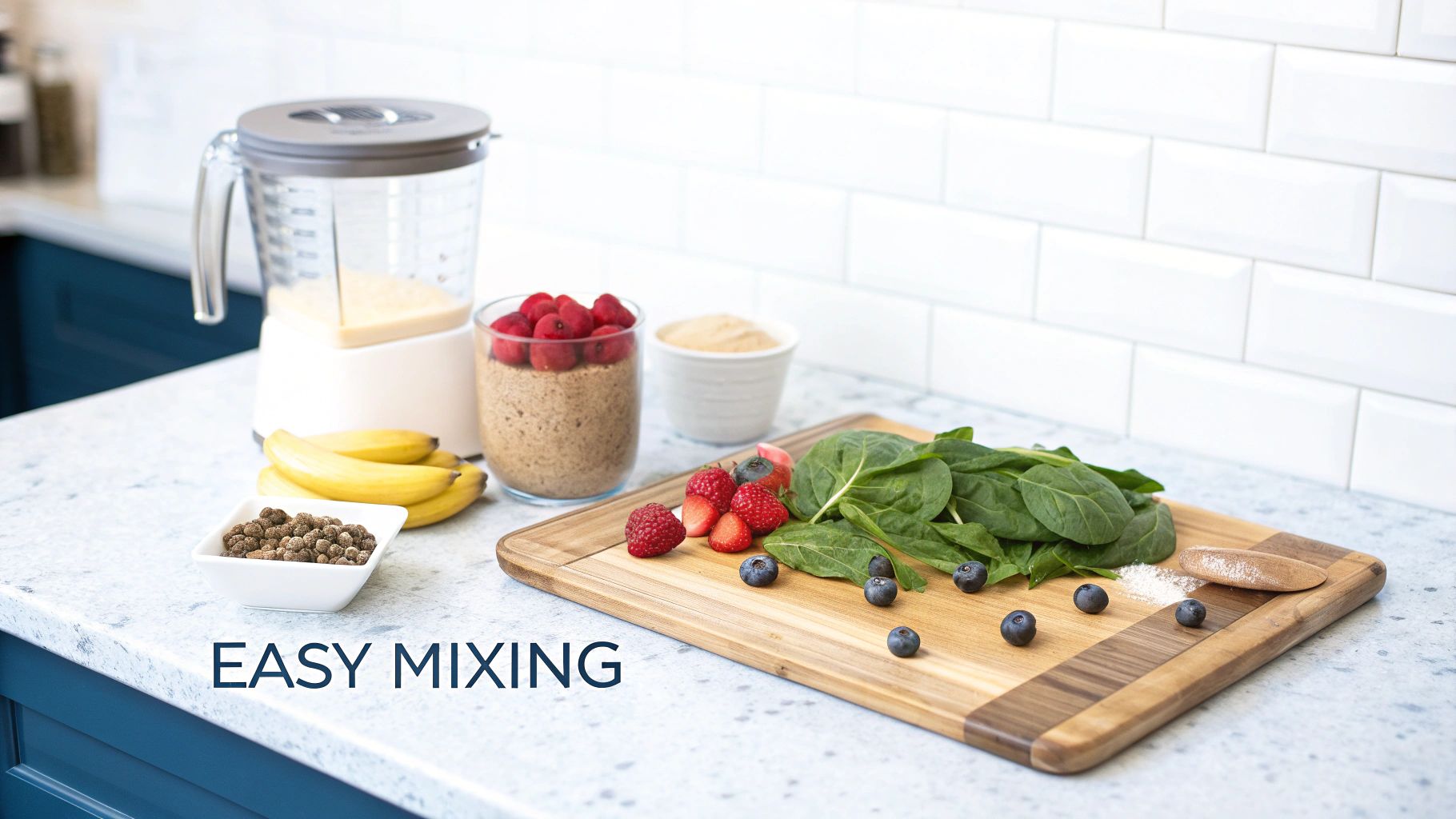Trying to find a supplement when you have Irritable Bowel Syndrome (IBS) often feels like you're just guessing and hoping for the best. But when it comes to finding a safe protein powder for IBS, it’s absolutely possible. The trick is to look for highly-filtered isolates, like whey protein isolate, or specific plant-based options such as rice and pea protein. These have had most of the common gut irritants stripped away, making them much kinder to a sensitive system.
How to Find a Safe Protein Powder with IBS

For anyone managing IBS, the search for a protein powder isn't just about fitness—it’s about finding something that won't trigger a miserable flare-up. You need a protein that adds to your health, not one that works against your gut. The good news is, once you know what to look for on a label, you can pick a product with confidence.
You're not alone in this search. The global market for IBS treatments was valued at around USD 2.79 billion and is only expected to grow. This reflects a huge demand for specialized dietary products, including gut-friendly supplements. You can read more about these market trends and see just how many people are looking for the same solutions.
The Power of Filtration and Simplicity
It helps to think about protein powders as being on a spectrum. At one end, you have concentrates, which are less processed. That might sound good, but it means they often contain more things that can cause trouble, like lactose. At the other end, you have isolates, which have been through a much more thorough filtering process.
An isolate is like finely sifted flour. The filtration process removes most of the lactose, fats, and carbohydrates, leaving behind a purer protein that is much easier for a sensitive gut to digest. This is why whey protein isolate is often well-tolerated while whey concentrate is not.
This same idea holds true for plant-based proteins. When you see powders made from rice or pea protein isolates, it means they've been stripped of the complex fibers and starches that can ferment in your gut and lead to bloating and discomfort.
Quick Guide to IBS-Friendly Protein Types
To make things a bit simpler, here’s a quick-reference table that summarizes the most common protein types and how they generally stack up for someone with IBS.
| Protein Type | General IBS Suitability | Key Consideration |
|---|---|---|
| Whey Protein Isolate | Generally Good | Must be an isolate to ensure lactose is removed. Avoid concentrate. |
| Beef Protein Isolate | Good | Naturally lactose-free and low-FODMAP. Check for added sweeteners. |
| Egg White Protein | Good | A great dairy-free option. Can cause issues for those with egg sensitivities. |
| Pea Protein Isolate | Often Good | Generally well-tolerated, but can be a trigger for some. Choose an isolate. |
| Rice Protein | Often Good | Typically very gentle on the stomach. Ensure it’s free from heavy metals. |
| Hemp Protein | Varies | Higher in fiber, which can be problematic. Better for those who tolerate fiber well. |
| Whey Protein Concentrate | Poor | High in lactose, a common FODMAP trigger. Best to avoid. |
This table should give you a solid starting point, but remember to always listen to your own body, as individual tolerance can vary.
Key Qualities of an IBS-Friendly Protein
When you're scanning labels, keep an eye out for these key qualities. Think of this as your checklist for quickly weeding out the bad stuff and zeroing in on a winner.
- Minimal Ingredients: Less is more. A shorter ingredient list means fewer potential triggers. Avoid powders packed with gums, fillers, and artificial sweeteners.
- No High-FODMAP Sweeteners: Stay far away from sugar alcohols like sorbitol, mannitol, and xylitol, as they are notorious for causing digestive distress. Unsweetened powders are ideal, but those lightly sweetened with stevia or monk fruit are usually safe bets.
- Isolate Over Concentrate: This is a non-negotiable. Always look for the word "isolate," whether it’s whey, soy, or pea protein. It's your best defense against common gut irritants.
- Third-Party Tested: A seal from a third-party tester, especially one that certifies a product as low-FODMAP, provides an extra layer of assurance that what's on the label is what's in the tub.
By keeping these principles in mind, you can stop feeling so overwhelmed by the wall of options. The goal is to learn what makes a protein powder a safe choice for you, turning label-reading from a chore into a skill. This way, you can find a protein powder for IBS that truly supports your health from every angle.
Understanding Common IBS Triggers in Protein Powders
Before you can pick the right protein powder for IBS, you first need to know what makes so many of them a minefield for your gut. Think of it like this: if your digestive system is a delicate garden, some ingredients are like fast-growing weeds that cause chaos. Knowing what these are is the first step to avoiding that awful bloating, gas, and pain.
A lot of popular protein powders are packed with ingredients known as high-FODMAP substances. FODMAPs are just specific kinds of carbs that don't get absorbed well in your small intestine. Instead, they ferment and kick off IBS symptoms. This is exactly why a basic whey protein concentrate, which is loaded with the FODMAP lactose, is a huge problem for so many people.
Once you can spot these troublemakers, you're not just following a list of "bad" foods—you actually understand why they mess with your system. This is what empowers you to read labels like a pro.
The Hidden Offenders on the Ingredient List
Often, the problem isn't even the protein source itself. It’s all the extras they throw in for better taste, a smoother texture, or a longer shelf life. This is where most of the IBS triggers are hiding.
Here are the main culprits to keep an eye out for:
- High-Lactose Dairy: As we mentioned, whey protein concentrate is a big one because of its lactose content. Unless a whey protein is a highly filtered isolate, it's usually best to avoid it.
- Sugar Alcohols: These sweeteners are famous for causing digestive upset. Watch out for anything ending in "-ol," like sorbitol, mannitol, and xylitol. They’re common in "sugar-free" products but are high-FODMAP.
- Certain Thickeners and Gums: Things like guar gum, inulin (often listed as chicory root), and carrageenan are used to make shakes less gritty. The downside is that they are fermentable fibers that can cause serious bloating and gas if you're sensitive.
Getting a handle on these additives is a game-changer for managing your digestion. If this is new to you, a good guide can make all the difference. To learn more about building a gut-friendly diet, check out our detailed overview of the low-FODMAP diet for IBS.
Artificial Sweeteners and "Natural Flavors"
Even things that sound innocent can be a problem. While artificial sweeteners like sucralose and acesulfame potassium are technically low in FODMAPs, many people with sensitive guts report that they still cause irritation.
The term "natural flavors" is another one to be wary of. It's a vague label that can legally hide a mix of ingredients, and some of them might come from high-FODMAP sources. Since companies don't have to list what's actually in there, you have no way of knowing if a trigger is lurking inside.
This is why powders with a simple, clear ingredient list—or even unflavored options—are almost always the safer choice when you're managing IBS.
How to Read Labels for Gut-Friendly Protein

Think of yourself as a supplement detective. This is easily the most important skill you can have when you're on the hunt for a protein powder for IBS. The front of the tub is all marketing—it tells a story. The back of the tub tells the truth.
To really get to the bottom of what's in your powder, you first need to learn how to read nutrition labels effectively. Once you flip that container over, your mission is simple: scan for red flags. This goes way beyond the protein source itself; you need to inspect every single additive.
The Most Important Word Isolate
Your first and most critical task is to scan for one powerful little word: isolate. When it comes to protein powders, especially whey, this word is your absolute best friend.
Here’s why it matters so much:
- Whey Protein Concentrate: This is the basic, less-filtered version of whey. It’s higher in lactose—a well-known high-FODMAP sugar that's a classic trigger for IBS symptoms like bloating, gas, and diarrhea.
- Whey Protein Isolate: This is the good stuff. It goes through extra processing to strip out almost all of the lactose and fat, leaving behind a much purer protein. For many people with IBS, this is the only way they can tolerate whey.
This isn't just a whey thing, either. Plant proteins like soy and pea also come in both concentrate and isolate forms. By choosing the isolate, you’re getting a cleaner product with fewer of the fibrous bits that can stir up trouble in your gut.
Think of it this way: a "whey protein blend" is a total mystery box. It's a way for companies to use cheaper concentrate to cut costs. But a product that proudly says "100% whey protein isolate" is being transparent. It's telling you exactly what you’re getting—a highly filtered, more gut-friendly option.
Decoding the Rest of the Label
Okay, so you've checked the protein source. What's next? Now it's time to hunt for the hidden irritants that often hide behind confusing, science-y names. Many powders that look safe at first glance are secretly packed with gut-disrupting extras.
Keep your eyes peeled for these common culprits:
- Sugar Alcohols: Immediately look for any ingredient ending in "-ol." Think sorbitol, mannitol, and xylitol. These are high-FODMAP sweeteners that are notorious for causing digestive chaos.
- Gums and Thickeners: Ingredients like inulin (often listed as chicory root), guar gum, and xanthan gum are thrown in to improve texture. The problem is, they can be highly fermentable, which for you means one thing: major bloating.
- Vague "Natural Flavors": This is a huge red flag. It's a catch-all term that can hide dozens of ingredients, and some of them might come from high-FODMAP sources. Unflavored powders are always the safest bet, followed by those that list the specific flavor source (like "cacao powder").
Ultimately, the goal is to find a powder with a short, simple, and recognizable ingredient list. The cleaner the label, the lower your risk of an unexpected flare-up.
Comparing The Best Protein Powders For IBS Sufferers
Now that we know what to look out for and avoid, let's talk solutions. Choosing the right protein powder for IBS isn't just about fitness goals; it's about finding a formula that won't send your gut into a tailspin. The best options are almost always the simplest ones—highly filtered powders with very few ingredients.
This need for specialized formulas isn't just a niche concern anymore. The North American powder dietary supplements market is huge, valued at around USD 10.20 billion. This growth is fueled by health-conscious people demanding products for specific needs, like gut health, making it easier than ever to find IBS-friendly options.
Let's dive into the most common protein sources to see which one could be your perfect match.
Whey Protein Isolate
If your body can handle dairy, whey protein isolate can be a fantastic choice. The magic word here is "isolate." This form of whey goes through a rigorous filtration process that strips out almost all the lactose—a major high-FODMAP trigger for many.
What's left is a fast-absorbing, complete protein that’s perfect for muscle repair right after a workout. Just be careful: if you see "whey protein concentrate" or a "whey blend," it's best to avoid it. Those versions contain much more lactose and are far more likely to cause an IBS flare-up.
Pea Protein Isolate
Pea protein isolate is a true powerhouse in the plant-based world and a great pick for many with IBS. It's naturally free of dairy, soy, and gluten, which automatically eliminates several common gut irritants.
It comes with a solid amino acid profile and is especially high in branched-chain amino acids (BCAAs), which are crucial for muscle growth. That said, some people with extreme sensitivities might still experience a bit of bloating from pea protein. The golden rule applies: start with a small serving to see how your body reacts.
Rice And Hemp Protein
Rice protein is often hailed as one of the most hypoallergenic and gentle proteins you can find. It's naturally low in FODMAPs and incredibly easy on the digestive system, making it a safe bet if other powders have given you grief.
Hemp protein is another strong contender. It offers a nice bonus of fiber and healthy fats along with its protein. It's a solid choice, but if you know fiber is a personal trigger for your symptoms, you'll want to be mindful of the amount. For an even deeper look, check out our guide on the top 7 best protein powders for IBS in 2025, which covers these in more detail.

Comparing Top IBS-Friendly Protein Powders
To make things a bit clearer, let's put these options side-by-side. Every protein source has its unique strengths and potential weaknesses when it comes to managing IBS.
| Protein Source | Pros for IBS | Potential Cons | Best For |
|---|---|---|---|
| Whey Protein Isolate | Very low lactose; complete amino acid profile; fast-absorbing for muscle repair. | Still contains trace dairy; not suitable for a dairy allergy or extreme sensitivity. | People without a dairy allergy who want a fast-acting, high-quality protein for post-workout recovery. |
| Pea Protein Isolate | Dairy-free, soy-free, gluten-free; strong amino acid profile (high in BCAAs). | Can cause bloating in some highly sensitive individuals. | Those looking for a potent plant-based option for muscle building who can tolerate legumes well. |
| Rice Protein | Extremely hypoallergenic; very easy to digest; naturally low-FODMAP. | Can be lower in some amino acids (like lysine) than other sources. | Individuals with multiple sensitivities or who have reacted poorly to other protein powders. |
| Hemp Protein | Complete protein; good source of fiber and healthy omega fats; easy to digest. | Higher fiber content might be a trigger for some; has a distinct, earthy taste. | Anyone seeking a nutrient-dense, plant-based protein with added fiber and healthy fats. |
Ultimately, the goal is to find what works for your body. This table should give you a great starting point for making an informed choice.
How to Safely Introduce Protein Powder to Your Diet

So, you’ve done your homework and picked out a protein powder that looks promising for your IBS. That's a huge step. But the next part is just as critical: making sure it actually agrees with your system. Bringing any new supplement into the mix with a sensitive gut requires a bit of strategy to avoid causing an unnecessary flare-up.
Think of it like testing the water before jumping into a pool. You wouldn't dive in headfirst without knowing the temperature, right? The same logic applies here. You don’t want to start with a full scoop of a new protein. The golden rule is simple: start low and go slow. This approach gives your digestive system time to get acquainted and lets you watch for any reactions.
Your Step-By-Step Introduction Protocol
A methodical approach is your best friend when it comes to avoiding digestive upset. A common mistake is rushing the process, which can lead you to blame a perfectly good protein powder when the real problem was just the serving size.
Follow these simple steps for a smooth start:
- Begin with a Micro-Serving: Start with just a quarter of a standard scoop. This small amount is usually enough to see how your gut will react without feeling overwhelmed.
- Mix It Wisely: Blend your tiny portion with water or a confirmed low-FODMAP milk alternative, like unsweetened almond milk. It's best to avoid regular dairy or soy milk at this stage, as they can bring their own FODMAPs into the picture and muddy the results.
- Wait and Observe: Stick with this small dose for 2-3 days. Pay close attention to your body. Do you notice any new bloating, gas, or changes in your bathroom habits? If everything feels normal, you're good to go to the next step.
- Increase Gradually: If all is well, you can move up to a half scoop for another few days. Keep increasing slowly until you reach a full serving, listening to your body’s feedback the entire time.
This slow and observant method is key. It puts you in the driver's seat, allowing you to find your personal tolerance for a new supplement without causing a major setback on your gut health journey.
Timing and Other Considerations
When you drink your protein shake can also play a role. Some people find that having it on an empty stomach first thing in the morning is a bit too much for their system. You might have better luck consuming it after a small meal or following a workout when your body is ready to absorb nutrients.
It’s also worth considering the protein source itself. Some proteins, like hemp, come with added benefits like fiber and healthy fats that can support your long-term digestive wellness. If you want to learn more about how certain plant proteins work with your system, you might find our article on hemp protein and gut health interesting.
By being patient and methodical, you can successfully add a high-quality protein powder to your routine, supporting both your fitness goals and your digestive peace of mind.
Common Questions About Protein Powder and IBS
Even when you've done your homework, trying a new supplement with a sensitive gut can feel like a guessing game. It's totally normal to have some lingering questions and feel a bit cautious. This section is here to tackle those common concerns with clear, no-nonsense answers.
Think of this as your go-to troubleshooting guide. We'll dive into the nitty-gritty details, from decoding sweeteners to figuring out what's wrong when even a "safe" powder rebels against you. The goal is to give you the confidence to navigate the supplement aisle and take control of your diet.
Can I Use Whey Protein If I Have IBS and Lactose Intolerance?
This is a fantastic question, and the answer all boils down to the type of whey protein you're looking at. Standard whey protein concentrate is going to be a hard pass—it's loaded with lactose, a well-known high-FODMAP trigger that will almost certainly cause a flare-up.
But whey protein isolate is a completely different beast. This form goes through an intense filtering process that strips out nearly all of the lactose and fat. Because of this, many people with lactose intolerance discover they can handle whey isolate just fine, with no digestive drama.
You just have to become a bit of a label detective. Look for products that clearly state they use 100% whey protein isolate and have zero to one gram of sugar per serving. That's your clue that the lactose content is incredibly low. Always, always start with a tiny serving—maybe a quarter of a scoop—to see how your body reacts before going all-in on a full shake.
Are Artificial Sweeteners Like Sucralose and Stevia Safe for IBS?
Sweeteners are a huge source of confusion, and how you tolerate them is incredibly personal. That said, some are definitely safer bets than others when you're trying to find a protein powder for IBS.
- Stevia and Monk Fruit: These are your best friends in the sweetener world. They're natural, don't have calories, and are considered low-FODMAP. Most people with IBS tolerate them very well.
- Sucralose: This one is a bit of a gray area. While it's technically low-FODMAP, a lot of people report it still triggers gas and bloating. My advice? Approach any product with sucralose with caution.
- Sugar Alcohols: This is the category you need to avoid like the plague. If you see an ingredient ending in "-ol" like sorbitol, mannitol, or xylitol, put the product back on the shelf. They are high-FODMAP and notorious for causing digestive distress.
Your safest bet is to pick an unflavored protein powder. If you really want a flavored version, make sure it's only sweetened with stevia or monk fruit.
What Should I Do If My 'IBS-Friendly' Protein Powder Still Causes Symptoms?
It's beyond frustrating when this happens, but don't give up. If a powder that's supposed to be "IBS-friendly" is still giving you trouble, it’s time to play detective. First things first, stop taking it immediately to give your system a break.
Next, grab the container and read the entire ingredient list again. Even if the protein source is fine, other sneaky additives could be the real culprits. Watch out for:
- Gums and Thickeners: Things like xanthan gum or guar gum can cause problems for highly sensitive people.
- "Natural Flavors": This is a frustratingly vague term that can hide a mix of ingredients that just don't sit right with you.
- The Protein Itself: It's rare, but some people simply don't get along with a specific protein source, even if it's low-FODMAP like pea protein.
Also, think about what you're mixing it with. Your protein powder might be innocent if your smoothie is full of high-FODMAP fruits. When you're testing a new product, always mix it with just water first to isolate the variable. If you suspect the protein source, try switching to a different base, like from pea to rice or hemp.
Is Collagen Powder a Good Protein Alternative for IBS?
For many people with IBS, collagen is an absolutely fantastic choice. It's known for being incredibly easy to digest and is naturally free of the usual suspects like lactose, gluten, and FODMAPs. Many people even say it feels soothing on their gut.
The only catch is that collagen is not a complete protein. It's missing the essential amino acid tryptophan, which means it shouldn't be your only protein source if your main goal is muscle building. However, if you're looking for a gentle way to boost your overall protein intake and support your skin, joints, and gut, unflavored collagen peptides are one of the safest and most reliable options out there.
At Cantein, we believe in clean, simple, and effective nutrition. Our organic hemp protein powder is crafted with just one ingredient to deliver powerful plant-based fuel without the fillers, gums, or sweeteners that upset sensitive guts. If you’re looking for a protein powder that supports both your fitness and your digestive health, discover the Cantein difference.

